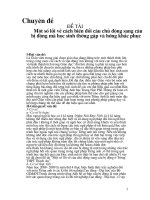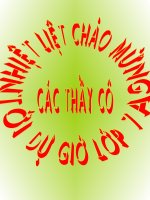cách biến đổi câu bị động sang câu chủ động
Bạn đang xem bản rút gọn của tài liệu. Xem và tải ngay bản đầy đủ của tài liệu tại đây (69.38 KB, 2 trang )
Passive voice mÉu 01
Active voice Passive voice
1. Simple present
S + V(es, s)
Eg: He learns English
1. Simple present
S + be (is, are, am) +V(3,ed)
Eg: English is learnt (by him)
2. Present continuous
S + be (is, are, am) + V-ing
Eg: He is learning English
2. Present continuous
S + be (is, are, am) + being +V(3,ed)
Eg: English is being learnt (by him)
3. Simple Past
S + V (2, ed)
Eg: He learnt English
3. Simple Past
S + were/was +V (3,ed)
Eg: English was learnt (by him)
4. Past continuous
S + be (were, was) + V-ing
Eg: He was learning English
4. Past continuous
S + were/was being + V(3,ed)
Eg: English was being learnt (by him)
5. Simple future.
S + will + V
Eg: He will learn English
5. Simple future.
S + will + be + V(3,ed)
Eg: English will be learnt (by him)
6. Present perfect
S + Has/ have + V(ed, 3)
Eg: He has learnt English
6. Present perfect
S + Has/ have + been + V(ed, 3)
Eg: English has been learnt (by him)
7. Modal verbs (can, may, could,
must,)
S + Modal verb + V
Eg : He can speak English
7. Modal verbs (can, may, could,
must,)
S + Modal verb + be + V(3,ed)
Eg : English can be learnt (by him)
8. “Be going to”
S + be( is, am, are) + going to + V
Eg: He is going to learn English
8. “ Be going to”
S + is/ am/ are + going to + be + V(3,ed)
Eg : English is going to be learnt (by him)
C©u nãi trùc tiÕp - C©u nãi gi¸n tiÕp
NÕu ®éng tõ t êng thuËt ë th× qu¸ khø th× ta biÕn ®æi theo quy t¾c sau:
1. §éng tõ chÝnh
C©u nãi trùc tiÕp C©u nãi gi¸n tiÕp
1. Will/ Shall 1. would/ should
2. Am/ is/ are going to 2. Was/ were going to
3. Present simple 3. Past simple
4. Present continuous 4. Past continuous
5. Past continuous 5. Past perfect continuous
6. Present perfect 6. Past perfect
7. Past simple 7. Past perfect
8. Must 8. Had to
9. Can 9. Could
2. Tr¹ng tõ
Today
that day
Tonight
that night
Tomorrow
the next day / the following day
Yesterday
the day before / the previous day
Ago
before
Now
then
Last Monday
the previous Monday / the Monday before
This
that
These
those
Here
there
3. Eg: C©u nãi trùc tiÕp : Mary said: “I m leaving’ here tomorrow”
C©u nãi gi¸n tiÕp : Mary said (that) she was leaving there the next day
-The end-









